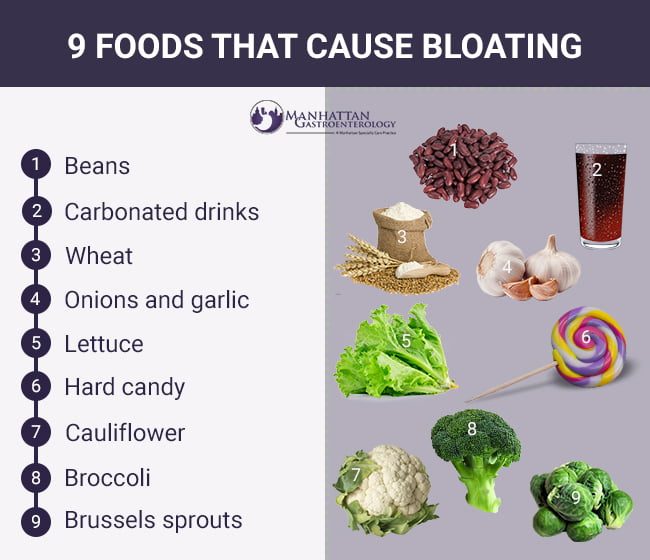According to the dictionary, bloating means expanding or distending, as with air or water. When you feel bloated, you feel full or over-full, as if your stomach has swollen well past its normal size. It’s an uncomfortable feeling, often accompanied by belching and passing gas. According to our Manhattan gastroenterologists, bloating can be very uncomfortable. It is the result of trapped gas in your stomach or intestines. If you’re experiencing bloating, that doesn’t always mean you’ve overeaten. It can mean that you’ve eaten too many of the wrong foods! However, there are many causes of bloating symptoms.
The Bloating Culprits
There are several causes of intestinal bloating that you can control, however. Fatty foods are one of the biggest culprits because fat disrupts digestion and prevents your stomach from emptying properly. Reduce the fat from your diet, and you’ll very often eliminate bloating altogether. These are some culprits, but only your gastroenterologist can formulate a diagnosis and an effective treatment plan to get you feeling better.
Carbohydrates also contribute to the excess gas that leads to bloating. Reducing or avoiding those foods that continually cause you to feel bloated may be in your best interest, especially when the bloating gets painful or uncomfortable. Foods associated with bloating include:
- Beans;
- Lettuce;
- Chewing gum;
- Hard candy;
- Cauliflower;
- Broccoli;
- Brussels sprouts.
Carbonated drinks naturally add those bubbles to your stomach. If you feel disgusted to belch or pass gas, you could get bloated from drinking a simple soda. You may also find that fruit creates a bloating bind that can be difficult to resolve without a serious bowel movement and plenty of embarrassing flatulence.
Simple Steps to Reduce Bloating

While you can avoid the foods and drinks that cause bloating, you can take other steps to alleviate the uncomfortable feeling. If you wear dentures, make sure they fit well; if they don’t, excess air can get into your stomach while you’re chewing. Also, eat and drink slowly to prevent air from slipping down your throat along with your food and beverages. And skip the straw: that’s a sure way to take in unwanted air that could distend your tummy.
Another effective tip is to take a walk after eating to get any gas to rise to the surface and prevent bloating. Try a calming technique like deep breathing or meditation to control your anxiety, which can help you avoid swallowing too much air. Don’t forget to drink water to help you stay regular and prevent bloating. And lastly, increase your dietary fiber intake to keep your bowels flowing smoothly every day.
If your bloating persists despite your diet and eating habit changes, keep a food record of what you’ve eaten when you’re experiencing discomfort. Maybe it’s a specific food that affects you adversely.
You should make an appointment with your Manhattan gastroenterologist or stomach doctor to rule out any underlying causes of your symptoms. Your distended tummy could be a symptom of a medical condition that has nothing to do with the bloating. In New York City, stress, smoking, irritable bowel syndrome, Celiac disease, lactose intolerance, and gastrointestinal infections can also cause bloating and many more concerning conditions, including cancer.
Contact us for more information on how our NYC Gastroenterologist can help reduce & treat bloating and for an accurate diagnosis and treatment plan.

